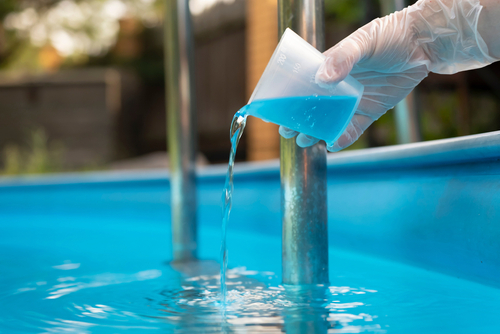A Crystal Clear Solution: The Importance of Pool Sanitation

Having a pool in your backyard is a dream come true for many homeowners. It provides a refreshing escape from the summer heat and creates a perfect setting for outdoor gatherings and relaxation. However, to ensure that your pool remains a safe and healthy environment for you and your loved ones, proper pool sanitation is of utmost importance. This blog will explore the significance of pool sanitation and the various methods available to maintain clean and crystal clear water.
Understanding Pool Sanitation
Pool sanitation refers to the process of keeping the water clean and free from harmful bacteria, viruses, algae, and other contaminants. Without proper sanitation, the water in your pool can become a breeding ground for germs and pose a serious health risk to swimmers. Additionally, poorly maintained pool water can lead to the deterioration of pool equipment and surfaces, resulting in costly repairs.
Chlorine: The Classic Sanitizer
Chlorine has long been the go-to sanitizer for pools due to its effectiveness in killing bacteria and controlling algae growth. It works by releasing chlorine gas into the water, which reacts with microorganisms, rendering them harmless. Chlorine also acts as a residual sanitizer, providing ongoing protection against contaminants. However, while chlorine is an efficient and widely used sanitizer, it can cause skin and eye irritation in some individuals. It is essential to maintain the appropriate chlorine levels to minimize these side effects.
Saltwater Chlorination: A Gentle Alternative
For those seeking a gentler alternative to traditional chlorine, saltwater chlorination systems may be the solution. Saltwater pools use a special system that converts salt into chlorine through a process called electrolysis. This results in a steady supply of chlorine, eliminating the need for manual chlorination. Saltwater pools are known to have softer water that is gentler on the skin and eyes. However, it is important to note that saltwater pools still contain chlorine, although at lower levels compared to traditionally chlorinated pools.
UV and Ozone Systems: Advanced Sanitizers
UV (ultraviolet) and ozone systems are advanced methods of pool sanitation that go beyond traditional chlorine. UV systems use ultraviolet light to kill bacteria, viruses, and other microorganisms in the water. Ozone systems, on the other hand, produce ozone gas, which oxidizes and eliminates contaminants. These systems can be used in conjunction with lower levels of chlorine, providing an additional layer of sanitation. UV and ozone systems are particularly effective at reducing the formation of chloramines, which are responsible for the strong chlorine odor often associated with pools.
Proper Filtration: A Crucial Component
In addition to sanitizing the water, proper filtration is essential for maintaining clean and clear pool water. A pool filter works by trapping and removing debris, such as leaves, grass, and dirt, from the water. There are three main types of pool filters: sand filters, cartridge filters, and Diatomaceous Earth (DE) filters. Each type has its own advantages and requires regular cleaning or maintenance to ensure optimal performance. A well-functioning filtration system enhances the effectiveness of pool sanitation by removing visible and microscopic particles from the water.
Regular Maintenance: The Key to Pool Health
Maintaining proper pool sanitation requires regular maintenance and attention to detail. Regularly testing and balancing the water’s pH and chemical levels, including chlorine or salt levels, is crucial. This can be done using pool testing kits or with the assistance of professional pool maintenance services. Routine cleaning of the pool’s walls, floor, and surface skimming to remove debris is also essential. Ensuring that all pool equipment, such as pumps and filters, are functioning properly is key to maintaining a healthy pool environment.
Summary
Maintaining proper pool sanitation is vital for the health and enjoyment of pool owners and their guests. Whether using traditional chlorine, saltwater chlorination, UV systems, or ozone systems, it is essential to choose the method that best suits your needs and preferences. Effective sanitation, combined with proper filtration and regular maintenance, ensures clean and crystal clear pool water, making your pool a safe and inviting oasis for everyone to enjoy. By prioritizing pool sanitation, you can create a hygienic environment that allows you to fully embrace the joys of owning a pool.
Need Pool Contractors In Los Angeles, CA?
Since 1999, Avanti Pools, Inc. has proudly been your locally owned and operated source for premier custom-designed pools and spas, serving Los Angeles and the surrounding areas with unparalleled quality and service. The experts at Avanti Pools, Inc. are A.P.S.I. certified professional pool builders that hold over 60 years of combined experience specializing in swimming pool and spa design and construction, automatic pool and spa covers, solar heating, self-cleaning pools, and much more. Our area of expertise lies in special engineering on difficult sites, so we are capable and fully equipped to handle even the most challenging of projects. Call the expert pool builders at Avanti Pools, Inc. today!
 (818) 501-3759
(818) 501-3759 How To Prepare Your Pool For Spring
How To Prepare Your Pool For Spring